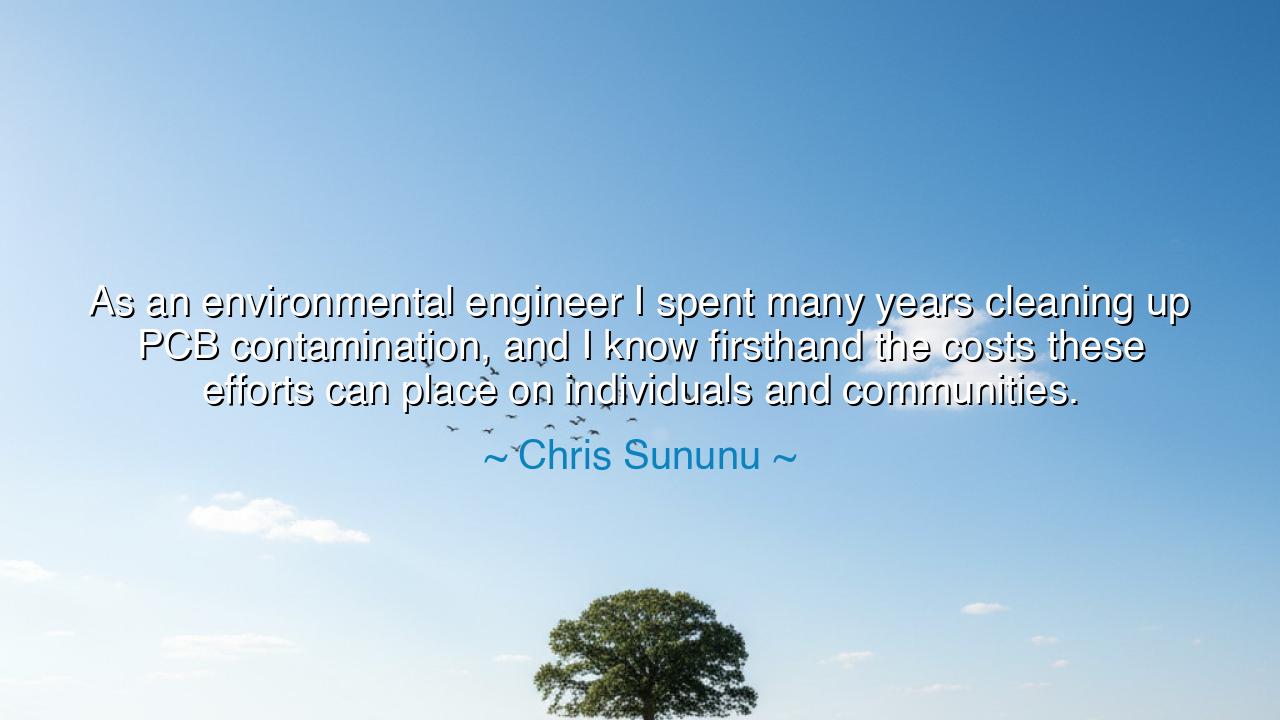
As an environmental engineer I spent many years cleaning up PCB
As an environmental engineer I spent many years cleaning up PCB contamination, and I know firsthand the costs these efforts can place on individuals and communities.






Hear now the words of Chris Sununu, who spoke not from books or hearsay, but from the hard ground of labor and the bitter air of poisoned places: “As an environmental engineer I spent many years cleaning up PCB contamination, and I know firsthand the costs these efforts can place on individuals and communities.” This is not the speech of one distant from toil, but of one who has stood among the ruins left by negligence, where earth and water cry out in silence, and where people bear the hidden wounds of contamination. His words are both testimony and warning, spoken to awaken us to the true burden of pollution.
When Sununu names PCB contamination, he summons the memory of one of humanity’s gravest mistakes. Polychlorinated biphenyls, once praised for their durability in industry, were poured into machines and rivers alike, until they seeped into soil, water, and bodies. They became invisible chains, binding generations to illness, infertility, and despair. What seemed at first a tool of progress revealed itself as a poison, and the task of cleansing its trace fell upon men and women like Sununu, who fought against a legacy of carelessness.
The costs he speaks of are not only measured in gold, though the sums to cleanse a river or landfill climb into the millions. The costs are also in the spirit—farmers who cannot sell their harvests, families who fear the water that flows from their taps, children whose bodies carry unseen toxins. A community poisoned does not simply lose its land; it loses its trust, its peace, and its confidence in tomorrow. Such wounds are slow to heal, for they touch not only soil and water, but also the heart.
Consider the story of the Hudson River in New York. For decades, factories dumped PCBs into its current until the mighty river became a carrier of sickness. Fishermen lost their trade, towns lost their pride, and whole communities were marked by contamination. The cleanup, spanning generations, drained treasure and patience alike, reminding all that the price of neglect is far greater than the price of foresight. The Hudson became not only a river of water, but a river of lessons—lessons written in hardship, sacrifice, and resilience.
The origin of Sununu’s words lies in his own labor, as one who bent his strength toward undoing what careless hands had wrought. As an environmental engineer, he learned that healing the land is no simple act; it is long, costly, and often incomplete. His voice carries the gravity of lived truth: that prevention is wisdom, but neglect is ruin. To hear his words is to hear the echo of the ancients, who once taught that man must live in harmony with the earth, lest he poison himself in pursuit of fleeting gain.
The meaning is thus both heroic and cautionary. Heroic, because men and women rise up to cleanse what is broken, restoring the streams and soils for future generations. Cautionary, because the scars of contamination show us that the earth remembers every wound, and healing it demands a price from the very people it sustains. The true strength of a society lies not in its ability to conquer nature, but in its humility to care for it.
Children of tomorrow, take this lesson as law for your hearts: do not wait to clean what you could have protected. Let your industries be guided by foresight, your inventions by responsibility, and your daily lives by reverence for the world that shelters you. Waste not, pollute not, and demand of your leaders that they place protection above profit. For once the soil is poisoned, once the river is fouled, once the air is darkened, the cost to heal is far greater than the cost to guard.
And so let this truth endure: the labor of healing contamination is noble, but the labor of prevention is divine. Walk wisely, honor the land, and remember always that the fate of the earth and the fate of its people are one and the same. This is the wisdom behind Sununu’s words—a wisdom won through struggle, offered to us as a warning, and entrusted to you as a torch to carry forward.






AAdministratorAdministrator
Welcome, honored guests. Please leave a comment, we will respond soon